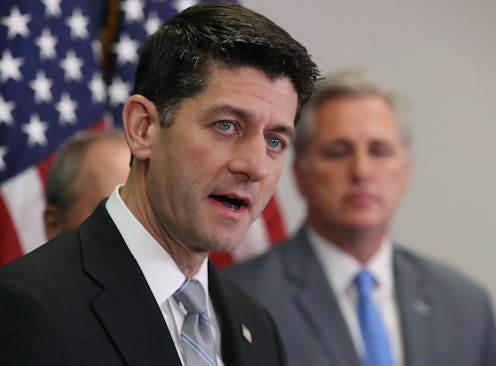News
Here's What You Need To Know About Whether The GOP Tax Plan Will Help You

A historic tax overhaul seems to be on the way. Both the House and Senate voted to pass the GOP's plan on Tuesday, and all that's left is a nearly ceremonial second vote in the House and President Trump's signature, which is expected. With its fate nearly certain at this point, you're probably wondering: Will the GOP tax bill help me?
Update: The House voted to pass the $1.5 trillion Republican tax bill on Wednesday again. It is the biggest overhaul of the U.S. tax code in 30 years. It now heads to President Trump's desk to be signed into law.
Earlier: The answer is complicated because some of its provisions change over time. Defining "benefit" is also tricky; less tax liability sounds great, but may also mean less money going towards government services that help you. Basically, you're probably going to get to keep more of your paycheck in 2018 if this bill becomes law, but the long-term effects of the overhaul may be less kind to you. Those could include anything from greater class stratification to higher taxes sometime down the road to pay for the huge deficit the plan will create.
Speaking about an earlier version of the bill, NYC economist and tax expert James Parrott told Bustle about its long-term risks. According to Parrott, millennial women "[will] have to look forward to living in a highly class-polarized, limited opportunity society where hereditary privileges are the norm, and likely, women will be expected to conform to traditional, patriarchal norms. That is the direction that radical changes like this tax bill very well may take us."
For now, we'll leave it up to you to analyze how these abstract possibilities could affect your life and just lay out bill's concrete impacts. Here's what the GOP tax plan definitely has in store for you.
Will My Basic Tax Rate Increase or Decrease?
The GOP tax bill keeps seven tax brackets, but changes the tax rate. Here's how it works for unmarried people:
- Under $9,325: 10 percent.
- $9,526 to $38,700: 12 percent.
- $38,701 to $82,500: 22 percent.
- $82,501 to $157,500: 24 percent.
- $157,501 to $200,000: 32 percent.
- $200,001 to $500,000: 35 percent.
- Over $500,000: 37 percent.
- Under $19,050: 10 percent.
- $19,051 to $77,400: 12 percent.
- $77,401 to $165,000: 22 percent.
- $165,001 to $315,000: 24 percent.
- $315,001 to $400,000: 32 percent.
- $400,001 to $600,000: 35 percent.
- Over $600,000: 37 percent.
These new individual tax rates expire after 2025 (the bill specifically sunsets these changes but makes the corporate tax cuts permanent). If they are not renewed, over 50 percent of Americans could see their taxes increase in 2027.
Will the Standard Deduction and Personal Exemption Increase or Decrease?
The standard deduction nearly doubles for both individuals (from $6,500 to $12,000) and married couples ($13,000 to $24,000). However, the personal exemption — which, for 2017, is worth $4,050 — is eliminated. For a couple with three or more children, the loss of the personal exemption outweighs the benefit of the new standard deduction.
Will My Itemized Deductions Increase or Decrease?
If you typically deduct $10,000 or fewer dollars in state and local taxes, you will see no change. If you deduct more than that, you'll now be capped at $10,000.
You can no longer deduct for paying someone else to do your taxes; for flood, storm, or fire damage (unless it came from a federally declared disaster); or for moving expenses (unless you're in the military).
Before, you could only deduct medical expenses when they went above 10 percent of your income (adjusted for other deductions), but now you can do so if they go above 7.5 percent. In 2020, the threshold will return to 10 percent.
Popular credits and deductions that were at risk of being eliminated but have been retained include those for adoption, student loan interest, and classroom teacher supplies.
How Will This Affect Me in Other Concrete Ways?
If the this sweeping tax bill becomes law, beginning in 2019, you will no longer be required to purchase health insurance or else pay a fine. This will likely prompt many younger, healthier people to opt out of buying plans, which will likely then cause premiums to increase. The Congressional Budget Office predicted that premiums would hike 10 percent by 2027 and that 13 million more Americans would be uninsured by that time.